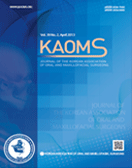Journal of the Korean Association of Oral and Maxillofacial Surgeons
- P-ISSN2234-7550
- E-ISSN2234-5930
- SCOPUS, KCI, ESCI
 ISSN : 2234-7550
ISSN : 2234-7550
Protocol for management of pregnant patients requiring emergency minor oral surgical procedures: a prospective study in 52 patients
Shushma G (Community Health Center, Kukanoor)
Uzma Hamidullah Siddiqui (Indrayani Cancer Hospital, Pune)
Minal Sharma (Kiran Multi Super Speciality Hospital, Surat)
Yaseer Irfan Shaikh (Private Clinic, Pune)
Pooja Raosaheb Tarte (Abhimanyu Dental and Maxillofacial Center)
Abstract
Objectives: Dental or maxillofacial emergencies are uncommon during pregnancy, but if they occur, they are challenging to treat due to potential risks. The mother should not be denied necessary medical or dental care because of pregnancy. The aim of the study is to observe outcomes of preg-nancy in patients requiring emergency minor oral surgical procedures during gestation and to determine the safety of the pregnant woman undergoing the procedure and the fetus. Materials and Methods: The study was conducted on 52 pregnant women requiring emergency oral surgical procedures. A standard treatment pro-tocol for treatment of specific entities was followed. Close monitoring and observation were the primary goal of treatment. All patients were followed postoperatively until complete recovery from the surgical procedures and then until birth of the baby. A control group of 52 healthy pregnant patients who did not require oral surgical procedures was considered for statistical analysis. The measurements to calculate observation were fetal loss (sponta-neous abortion), preterm birth, low-birth weight, or incidence of any congenital anomalies in the baby and its association with surgical procedures. Results: No fetal loss occurred in any of the cases. However, four patients experienced preterm birth and seven neonates exhibited low birth weights. No congenital abnormalities were discovered. In one instance, a patient who underwent surgery for a mandibular symphysis fracture under general an-esthesia in the 31st week of pregnancy experienced labor pain on the fourth postoperative day, requiring an emergency Caesarean section. Conclusion: The results of our study demonstrate that, compared to the control group, minor emergency surgeries performed during pregnancy have no discernible negative effects on the fetus. These procedures can safely be performed by adhering to our described protocols.
- keywords
- Pregnancy, Minor oral surgical procedure, Emergency, Pregnancy outcome
- Downloaded
- Viewed
- 0KCI Citations
- 0WOS Citations